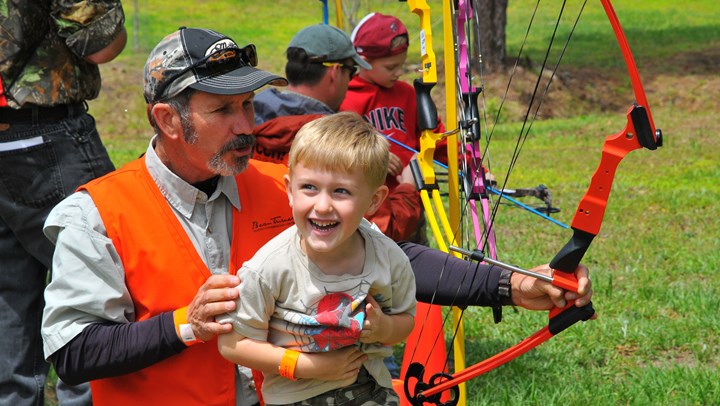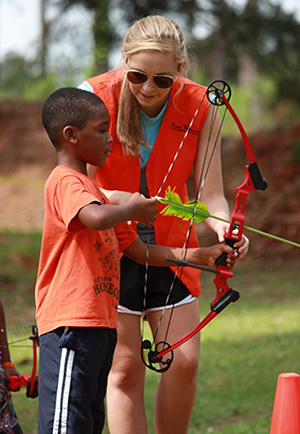
by Chris Chaffin - Friday, May 26, 2017

Today’s “old” hunters can remember when hunting traditions and knowledge were automatically passed from father to son, when there was little, if any, discussion about the role of hunting—because it was a given. Hunting was a natural part of their connection to the land in a largely agrarian society, and they needed to feed their families.
In the post-World War II years, however, things changed. Cities grew larger, transportation expanded, education became more readily available and kids left the family farms to seek careers in the cities. Many did not maintain their connection to the land and hunting. Urbanization cut through many of the traditional threads that once wove the tight fabric of America’s hunting culture.
Fast forward several generations. Today the challenges of creating a new hunter are magnified via rampant urban sprawl, the industrialization of farmlands, a drastic decrease in access to huntable land and an ever-increasing technologically-dependent lifestyle. Many children devote multiple hours a day to entertainment media and "media multi-tasking."
So, for those who realize the value of the life lessons learned through hunting, how do we redirect the pendulum? How do we connect future generations of hunters to the land, to our commitment of stewardship for our natural resources and to our hunting heritage? One way is to introduce young folks to outdoor programs that educate them about conservation, the web of life and how hunting is an important part of scientific wildlife management.
Spotlight on Florida
When it comes to highlighting educational state-based outdoor programs, one notable prime example is the Florida Youth Conservation Centers Network (FYCCN). Co-sponsored by the Florida Fish and Wildlife Conservation Commission (FWC) and the Fish and Wildlife Foundation of Florida (FWFF), FYCCN was born out of the concern that kids who aren’t exposed to traditional outdoor activities—fishing, hiking, hunting and boating—won’t develop a strong stewardship ethic for conserving wildlife. The mission of the FYCCN and its expanding statewide network of conservation centers is two-fold: 1) Remove the barriers that keep youth and their families from enjoying the outdoors; and 2) Encourage and empower kids through conservation education and hands-on outdoor experiences.
Rae Waddell, director of the FYCCN, said, “The Florida Youth Conservation Center Network is dedicated to 'Creating the Next Generation That Cares' about fish and wildlife conservation. This successful program, launched in 2010, works with more than 300 partners to introduce kids throughout Florida to fishing, boating, shooting sports and wildlife discovery." In teaching outdoor skills at their respective community facilities, Waddell explains, "FYCCN partners fuel young, creative minds through outdoor adventure while igniting their interest in conservation. FYCCN reaches youth in Florida’s most urban areas, teaching not only outdoor skills but how to conserve our precious natural resources.”
Identifying Essential Programs and Activities
The FWC/FWFF conducted research and community outreach to determine vital FYCCN program components and the organizations that could help make their vision a reality. While not all programs would be available at every partner site, each site could offer a combination of activities such as: five-station shotgun; target- and 3-D archery; smallbore rifle; conservation education; wildlife viewing; fishing and boating; wilderness trails; and habitat restoration areas.

FYCCN also offers statewide summer-camp programs. While activities sometimes differ, all share a conservation and outdoor recreation theme. Some of these camps, such as the Ocala Outdoor Adventure Camp and Everglades Youth Conservation Camp, have offered fun and affordable camps for decades.
All things considered, the FYCCN accomplishes its goal, connecting kids from Florida’s multi-cultural, diverse and eclectic society with nature. Directly aligned with hunting, the camps provide the opportunity for participants to complete their hunter safety course.
One example of a burgeoning FYCCN camp is the Beau Turner Youth Conservation Center in the Florida panhandle, which offers birding, hiking, fishing, archery, shooting sports, hunting, kayaking and boating. In helping participants to develop a personal relationship with the outdoors, the week-long BTYCC offers both basic and advanced hunter preparation classes. Wildlife identification, survival, wilderness first-aid, treestand safety, conservation, laws and ethics are just a few of the topics covered. Certified instructors teach safe firearm handling and hands-on training. In the advanced hunt camp, participants can enhance their marksmanship skills while enjoying advanced lessons in wildlife identification and behavior, outdoor survival and hunter safety.
Fostering the Hunting Heritage
Last but not least, in supporting the all-American hunting tradition, Florida also maintains an active youth hunting program that offers mentored youth hunts. Private landowners graciously open up their property to permit young hunters, accompanied by a parent or guardian, to learn outdoor skills while experiencing hunts for deer, turkey, hogs, waterfowl, dove, small game and more. For more information, click here.
Our rich and priceless hunting heritage will be maintained only if it is valued by the next generation of hunter-conservationists. It is clear that the bond between hunting and wildlife conservation is inescapable. We must find meaningful ways to connect America's youth with the outdoors. We must provide opportunities for them to see, feel, smell and emotionally embrace the natural cycle of life and the stewardship role upon which the continuation of our resources and hunting heritage depend. Programs such as Florida’s FYCCN do just that.
■ ■ ■
About the Author
Chris Chaffin has been an outdoor communicator, educator and partnership manager for more than 40 years. He has worked on the national scene representing several prominent components of the outdoor community promoting hunting, fishing, the shooting sports and conservation. He served two terms as Treasurer for the Professional Outdoor Media Association (POMA), eventually taking on roles as vice-president, President and Chairman of the Board.

In 2007, he launched Chaffin Communications, Inc., a communications consulting company focusing on the outdoors. In 2012, with support from the Outdoor Adventure Dream Giveaway, Chaffin founded and currently manages the Outdoor Adventure Conservation Fund, a Florida non-profit established to encourage and facilitate more people participating in traditional outdoor activities. For more information, click here.
E-mail your comments/questions about this site to:
[email protected]
